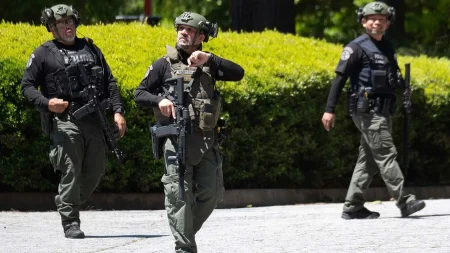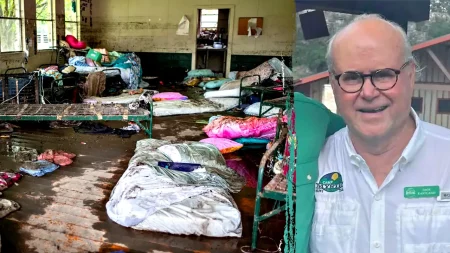A Shocking Attack in North Dakota: Woman’s Alleged Hatchet Assault on Sleeping Boyfriend
In the quiet hours of an early September morning in Fargo, North Dakota, what began as a peaceful night’s rest ended in a horrifying act of violence that has left a community stunned. Twenty-three-year-old Lena Deoliveira allegedly attacked her sleeping boyfriend, Jonathan Granados, with a hatchet in a garage where they were staying around 5 a.m. on September 5th. The incident has drawn attention not only for its brutality but also for Deoliveira’s unsettling demeanor following her arrest—her mugshot capturing an incongruously wide smile that contrasts starkly with the gravity of the charges she faces: attempted murder and aggravated assault. The young woman, described as homeless and known to “couch surf” in the garage and neighboring homes, is currently being held on a $500,000 bond with a court appearance scheduled for October 16th in Cass County.
The attack, according to court documents, came without warning while Granados slept. A witness staying in the same garage reported being awakened by “blood-curdling screaming” and observed Deoliveira striking Granados with the hatchet. The witness’s account paints a disturbing picture of the assault, describing sounds like “splitting wood” and noting the gruesome injuries to Granados’s head and hands. “He saw blood and a mark through Johnny’s skull,” the charging documents state, adding that the witness believed Granados had suffered multiple strikes because “one or two of Johnny’s fingers were missing or ‘kind of hanging.'” This eyewitness, who remains unidentified in reports, suspected Deoliveira was “out of it” during the attack but realized what had happened upon seeing blood and hearing the click of the couch’s footrest.
In the immediate aftermath of the assault, Deoliveira reportedly fled the scene, leaving behind a trail of blood that officers would later discover leading from the garage. Emergency responders rushed Granados to the emergency room for treatment of his severe injuries, which medical professionals confirmed included a “large slice” in his head and severely lacerated fingers. When speaking with investigators, Granados corroborated the witness’s statement, emphasizing that the attack came completely without warning while he was asleep—a vulnerable state that adds another troubling dimension to the already disturbing incident. Police launched a search for Deoliveira, who had disappeared into the community following the violent outburst.
Two days after the attack, on September 7th, law enforcement located and apprehended Deoliveira in neighboring Moorhead. The Fargo Police Department announced on their Facebook page that she was arrested “without incident,” a calm resolution that stands in sharp contrast to the chaos she allegedly unleashed. What caught public attention, however, was Deoliveira’s booking photo. While most individuals facing such serious charges appear somber or distressed in their mugshots, Deoliveira was captured with beady eyes and a wide grin—an expression that has added an unsettling psychological element to an already disturbing case and prompted speculation about her mental state at the time of both the attack and her arrest.
The community of Fargo has been left to grapple with the implications of this violent incident occurring in their midst. For neighbors who may have known Deoliveira as she moved between temporary accommodations in the area, the alleged attack raises difficult questions about recognizing potential warning signs of violence and the challenges faced by those experiencing housing insecurity. The garage where the attack took place represents a precarious living situation that reflects broader societal issues of homelessness and inadequate support systems for vulnerable individuals. While court documents don’t specify a motive for the attack, the case highlights how unstable living conditions can sometimes intersect with personal crises, with potentially devastating results.
As Deoliveira awaits her October court appearance, the legal system will now begin the process of examining not just what happened that September morning, but potentially why it happened. Questions about mental health, substance use, relationship dynamics, and access to support services will likely form important context for understanding this case. Meanwhile, Granados faces a long road to recovery from his physical injuries, which may have long-term consequences for his health and ability to use his hands. The witness, too, must process the trauma of having observed such violence. While the full story of what led to this shocking attack may emerge through the legal proceedings, the image of Deoliveira’s unsettling smile in her mugshot serves as a haunting reminder of the complex and sometimes disturbing nature of human behavior, particularly when it manifests in acts of extreme violence against those closest to us.











